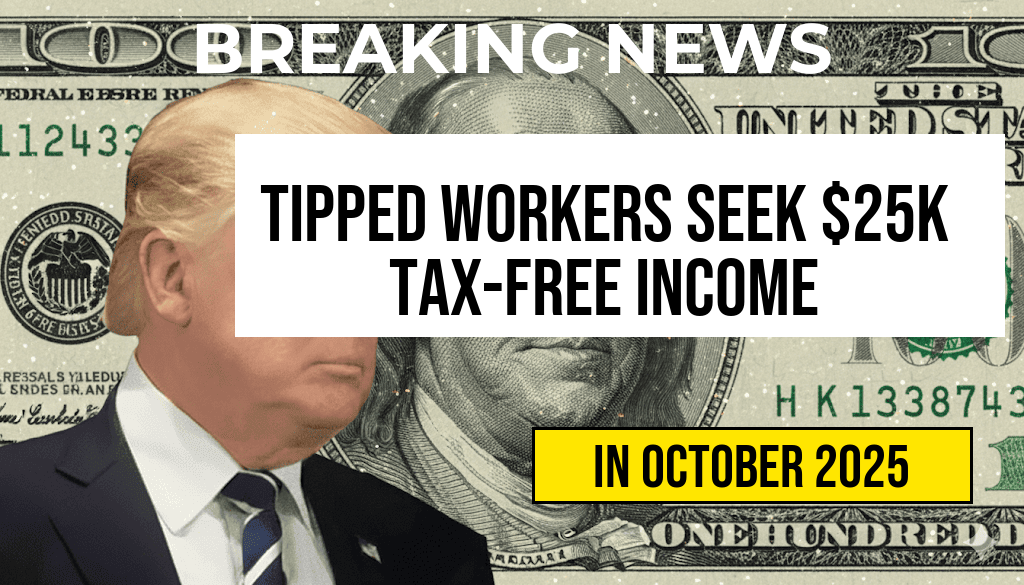Tax ‘No Tips’ Rule Extended Through 2028 with a $25,000 Annual Cap You Can’t Overlook
The U.S. Treasury Department has announced the extension of the controversial “No Tips” tax rule through 2028, a move that continues to impact millions of workers nationwide. Under this regulation, tip income received by employees in certain service sectors, particularly in the hospitality industry, will be subject to specific reporting thresholds. Notably, the policy imposes a $25,000 annual cap on tip income that can be reported without further scrutiny, effectively capping the amount workers can declare for tax purposes. This extension, announced in a recent notice, aims to streamline tax compliance but raises questions about fairness and the financial wellbeing of tipped workers.
Background and Context
The “No Tips” rule was introduced as part of broader tax reform measures aimed at simplifying reporting requirements for small-scale income earners. It primarily targets employees in sectors where tips constitute a significant portion of their earnings, such as restaurants, bars, and hotel services. The regulation stipulates that workers can report up to $25,000 in tip income annually without triggering additional documentation or audits. Income beyond this threshold requires more detailed reporting and verification, which can create administrative burdens for both workers and tax authorities.
The extension of this rule through 2028 was initially set to expire in 2024 but was extended amid ongoing debates over its impact. Advocates argue that the cap provides clarity and reduces compliance costs for small earners, while critics contend it may underreport actual income, potentially affecting both tax revenues and workers’ compensation rights.
Implications for Workers and Employers
For tipped workers, the extension means a continued limitation on how much tip income can be reported without additional scrutiny. Workers earning close to or above the $25,000 cap may need to meticulously track their tips or risk facing audits or penalties. For employers, the policy simplifies payroll reporting but also shifts some administrative responsibilities onto employees.
| Aspect | Details |
|---|---|
| Annual Tip Reporting Cap | $25,000 |
| Reporting Requirements | Up to cap: minimal; beyond cap: detailed documentation needed |
| Effect on Tax Revenue | Potential underreporting of actual tip income |
| Worker Impact | May limit earnings visibility for those earning above cap |
Public Response and Industry Perspective
The extension has sparked mixed reactions across the hospitality industry and labor advocacy groups. Some industry leaders appreciate the predictability and reduced compliance costs, especially for small businesses managing numerous employees. However, labor rights advocates warn that capping tip reporting could lead to underpayment of taxes and undermine workers’ ability to accurately report income.
According to the National Restaurant Association, the policy provides “necessary clarity for small operators navigating complex tax rules,” but groups like the AFL-CIO argue that it “disproportionately affects low-income workers who rely heavily on tips.” Critics emphasize that without proper safeguards, the cap might encourage underreporting, potentially weakening workers’ social safety nets and retirement benefits.
Legal and Policy Considerations
The extension aligns with ongoing efforts to modernize tax compliance systems, leveraging technology to better track income streams. The IRS has recently implemented new digital tools aimed at improving tip reporting accuracy, but concerns persist about enforcement and fairness. Some legislators have called for reforms to ensure that tip income is fully reported and taxed appropriately, emphasizing that the cap should not hinder transparency or workers’ rights.
Legal experts note that while the policy provides a structured framework, it does not prevent workers from voluntarily reporting higher tip incomes or seeking additional protections. The U.S. tax code continues to evolve, and future adjustments could modify how tip income is taxed and reported.
Looking Ahead
As the 2028 deadline approaches, stakeholders from all sides are closely monitoring the policy’s impact. The extension reflects a balancing act between administrative simplicity and fair taxation, but ongoing discussions suggest that reforms may be on the horizon. For workers in the service industry, understanding the limits of the “No Tips” rule and maintaining accurate records will remain essential to avoid complications during tax season.
For more information on tax regulations affecting tipped income, visit the IRS official guidance.
Frequently Asked Questions
What is the main change to the tax ‘No Tips’ rule announced in the article?
The tax ‘No Tips’ rule has been extended through 2028, with a new annual cap of $25,000 on tips that can be excluded from taxable income.
How does the $25,000 annual cap impact service workers?
The cap limits the amount of tips that service workers can exclude from their taxable income each year, ensuring they report and pay taxes on tips exceeding this threshold.
Why was the extension of this rule significant for service industry employees?
The extension provides continued clarity and benefits for service workers by maintaining the ability to exclude up to $25,000 in tips from income, simplifying tax planning through 2028.
Are there any changes to how tips are reported to the IRS under this rule?
The rule emphasizes that all tips exceeding the $25,000 annual cap must be reported to the IRS, ensuring transparency and proper tax compliance.
Will this extension affect my tax filings if I receive tips?
Yes, if you receive tips, you should be aware of the $25,000 cap, as tips up to this amount can be excluded, but any tips exceeding this limit must be included in your taxable income during filings.










